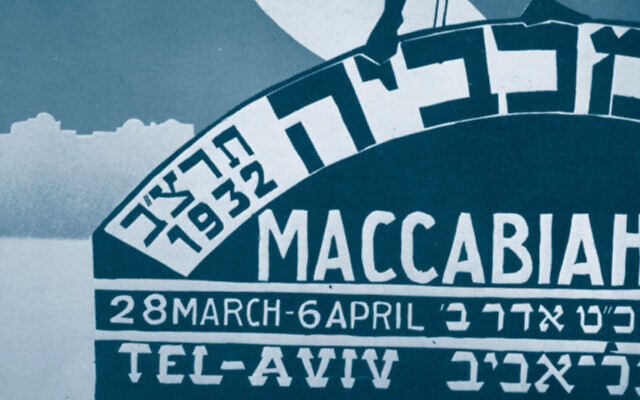Sport, the Maccabiah and religious approaches
With the Maccabiah finally at hand after COVID-caused cancellations, a reflection on its origins and early religious approaches thereto is timely.
Sport was certainly not a matter of interest to the Old Yishuv in what we now term Israel, prior to the commencement of the Zionistically inspired aliyot.
The first sports clubs in the country (the Rishon l’Zion and Bar Giora clubs) were established in Jaffa and Yerushalayim in 1906. The first Maccabi club was established in Yerushalayim in 1911 and a second in Petach Tikva in 1912.
That year saw all four clubs join to form the country-wide Maccabi organisation. By 1914 there were 1000 members in 15 clubs with gymnastics the dominant sport. After World War I, Maccabi clubs were established across the Diaspora.
With British army soccer teams seeking to compete with Jewish (Palestinian) teams in the 1920s Mandatory era, and competitions even taking place between Maccabi and teams drawn from clubs based in Egypt and Beirut, 1925 saw the founding of the Organisation of Jewish Soccer Clubs.
In 1931, Maccabi initiated the establishment of the Palestine Amateur Sports Federation and the following year saw the first international Maccabiah Games. 500 Jewish athletes from 23 countries participated – together with the local participants there were 1500 athletes involved mainly in gymnastic displays. The second Maccabiah in 1935 had 1700 participants from 27 countries – many of whom decided to remain in Palestine given the ominous portent of developments in Europe. Neither games had Australian representation.
Australian representation began only in 1951 when Elias Honig, an Australian tennis player resident in Israel participated, while by 1953 two Australian athletes – Bernie Jacks (Qld) and Judy Kellerman (NSW) actually travelled from Australia for the games and participated.
However as indicated above, such sporting matters were of no interest to the Orthodox sector of the community, especially that of Yerushalayim. And the lack of interest turned into serious antipathy when soccer matches were played on Shabbat. Demonstrations disturbed many games including an occasion on October 14 (Tishrei 24) 1933 when a group without tickets burst onto the ground and interfered with the game.
As it was believed by Maccabi that that demonstration and other disturbances had been instigated by “the rabbis” it was decided to send a deputation to Rav Avraham Yitzchak Kook, then the Chief Rabbi, to sort out the matter.
Under the heading “Harav Kook and football” the newspaper Doar Hayom then reported as follows:
“The deputation emphasised to Rav Kook the respect of all Maccabi participants wherever they might be to the ‘religion of Israel’. No ‘chillul Shabbat – desecration of Shabbat’ was carried out by members and for the future the members undertook to prevent any such desecration within the boundaries of the sports field.”
They also stated their determination to carry out the following four undertakings:
“No tickets would be sold to Jews on Shabbat.
Smoking at the ground was absolutely forbidden.
Sale of anything was forbidden.
The members would do their best to achieve these ends in full as early as possible.”
Although Rav Kook was unable to achieve an undertaking that no games be played on Shabbat, he thanked them for their decisions and asked them to fulfil their promises to refrain from Chillul Shabbat and desecration of the religion as a whole. (There seems to be an implication of an acceptance that playing per se may not desecrate Shabbat.)
However that same report noted that over and above expressing appreciation of their offer, in response to the deputation Rav Kook expressed the following words (the English is my translation from the published Hebrew text):
“Sport is ‘davar shebik’dusha – a matter of holiness’. The Maccabi movement is one of the most important foundations of our movement of (national) coming to life. In sport there is much refinement and nobility of the soul. My worldview regarding athletics/exercising has been previously publicised and I haven’t changed it. It has much idealism. It is incumbent upon us to return to our people the might of the mighty ones of Judah that is necessary for us for the building of the nation and its land. It is ‘de’ah meshubeshet – a distorted opinion’ that opposes sport; such an opinion is not suited to life and reality. Do we not say (in High Holy Day prayers) ‘Melech chafetz bachayyim – the King that desires life’ and therefore we must fight against the stumbling blocks in our way. It is incumbent upon us to strengthen our strengths and direct them towards the building of the nation.”
Indeed Rav Kook’s approach, in this instance and so many others, was vastly different from that of other significant elements of the religious community and their leadership in inter-war Palestine. In fact it joined other issues that became sources of criticism of his rabbinic position and tenure by the pre-war anti-Zionist Charedi community that still have echoes today.
But even now, almost 90 years later, his approach to sport as communally beneficial, as well as to peacemaking between philosophically different elements of our community, provides much food for thought.
Let me just add that during the interwar mandatory period “football” (i.e. soccer) competitions were initiated and encouraged by members of the British army stationed in Palestine. Local matches aside, in May 1938, Maccabi Tel Aviv embarked on a tour of Australia that lasted till just prior to World War II. The Jewish team played 19 matches across the continent, appearing in some matches as “Palestine”. Maccabi won 11 of the matches and lost five while three were drawn.
I conclude with best wishes for hatzlachah to all Australian contestants and the best of luck to all other participants as well. May the carnival pass peacefully and even as we pay tribute to the victims of the terrible bridge disaster of July 14, 1997, we pray that such may never happen again.
Shabbat shalom,
Yossi.
Yossi Aron OAM is The AJN’s religious affairs editor.


comments